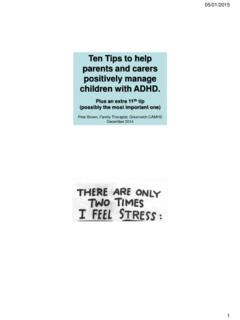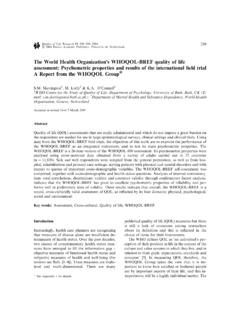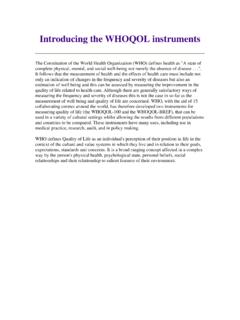Transcription of A practical toolkit for clinicians
1 Helping you to assess cognitionA practical toolkit for clinicians1 Professor Clive BallardProfessor of Old Age-Related DiseasesKing s College London and Alzheimer s SocietyProfessor Alistair Burns Professor of Old Age Psychiatry, University of Manchester and Clinical Director for Dementia, Department of Health Dr Anne Corbett Lecturer in Dementia Research CommunicationsKing s College LondonProfessor Gill LivingstonProfessor of Mental Health of Older People University College LondonDr Jill RasmussenClinical Champion for DementiaRoyal College of General PractitionersThis toolkit was created by the following authors with contributions from an expert writing group (see page 41 for a full list of members).
2 The toolkit is supported by Alzheimer s Society and Department of we developed this toolkit 3 The consultation process 4 About this toolkit 5 How to use this toolkit 6 Pathways for cognitive assessment 7 Cognitive assessment in primary care 8 Cognitive assessment in memory clinics and for outpatient specialist assessment 10 Cognitive assessment in acute care settings 12 Cognitive assessment in care homes 14 Information for specialists 16 Mild cognitive impairment (MCI) 17 Summary of the assessment tools availble 18 assessment tools 22 Abbreviated mental test score (AMTS) 23 6-Item cognitive impairment test (6 CIT) 24 General practitioner assessment of cognition (GPCOG) 25 Mini-cog 27 Dementia commissioning for quality and innovation (CQUIN) 28 Addenbrookes cognitve examination-III (ACE-III)
3 29 Montreal cognitive assessment (MoCA) 38 Other tests 40 Advisory group 412134 ABCDEFGH3 Cognitive assessments cover a very broad range of activities. They can take place: in a number of settings primary care, specialist memory clinics, acute care and care homes for a variety of purposes screening, diagnosing, staging and measuring change over a number of domains memory, language, executive function. So, it is not surprising that there is no single examination which covers all these situations.
4 A multitude of cognitive function tests have been developed. Each has its own unique selling points, advantages and detractors. The tests vary in how long they take and the amount of equipment you need to carry them out. Some are available for free, while for others you will need to gain permission and pay a fee. There have been many reviews of cognitive assessment tests over the years, some of which report detailed information about the psychometric properties of different tests and others which more simply describe their properties .
5 We developed this toolkit because we wanted to give clinicians guidance about what tests are available and how they may be used in clinical practice. This is particularly timely as the commonly used Mini Mental State Examination (MMSE), which is copyrighted, now incurs a cost for each use, so there is a need to identify we developed this toolkitMeasuring someone s cognitive function is one of the most important assessments clinicians make, particularly those in old age psychiatry and geriatric medicine. It is key to detecting dementia and delirium.
6 Please note We have assumed that clinicians using this toolkit have clinical knowledge about the measurement of cognitive function These tests are not diagnostic of any specific disorder and should be interpreted in the context of an individual s previous cognitive function. Appropriate training and supervision is needed to correctly interpret the results. As there is no single test which covers every eventuality, we recommend clinicians become familiar with one test and use it also welcome any validity data for any tools included in this toolkit .
7 The tools suggested in the main pathways are well validated for use in dementia. However, a number of the tools supplied in this toolkit still require full validation. If you are a clinician and have data to contribute to this process, please send a Microsoft Excel document to the email address and validity data can be submitted to Alzheimer s Society online at or by post or email to:Alzheimer s Society Research Devon House, 58 St Katharine s Way, London E1W Please put either toolkit validity data or toolkit feedback in the subject consultation processThis toolkit is a working draft and under consultation until 30 June 2013.
8 Until then, we welcome all feedback about the content and how easy it is to use. A final version of the toolkit will be available from Autumn toolkit was developed by a multidisciplinary advisory group, and informed by clinical experience and reference to relevant literature. The views expressed in the toolkit are those of the authors and the advisory using the toolkit , please note: The suggestions are based on clinical experience and information. They are based on, but not exclusively driven by, empirical research evidence and systematic reviews.
9 It is not meant to be used as a dementia screening or diagnostic tool. It should only be used to assess cognition where there is clinical suspicion that a patient has a cognitive impairment, regardless of its cause (in particular dementia and delirium). The toolkit focuses solely on cognition and not the other key aspects of dementia, such as behavioural and psychological symptoms, perception, executive function and daily living activities. The suggested tools are intended for use alongside the detailed form of neuropsychological testing carried out in memory clinics.
10 It does not include assessment relating to mild cognitive impairment (MCI) (where there is cognitive impairment not amounting to dementia). assessment of MCI is generally a task for specialists. You can find more information about MCI in the Information for specialists section on page this toolkitThis toolkit offers practical advice for clinicians about a choice of cognitive tests which can be used to assess cognition in clinical settings. All of the suggested tests are available to clinicians free of charge.






